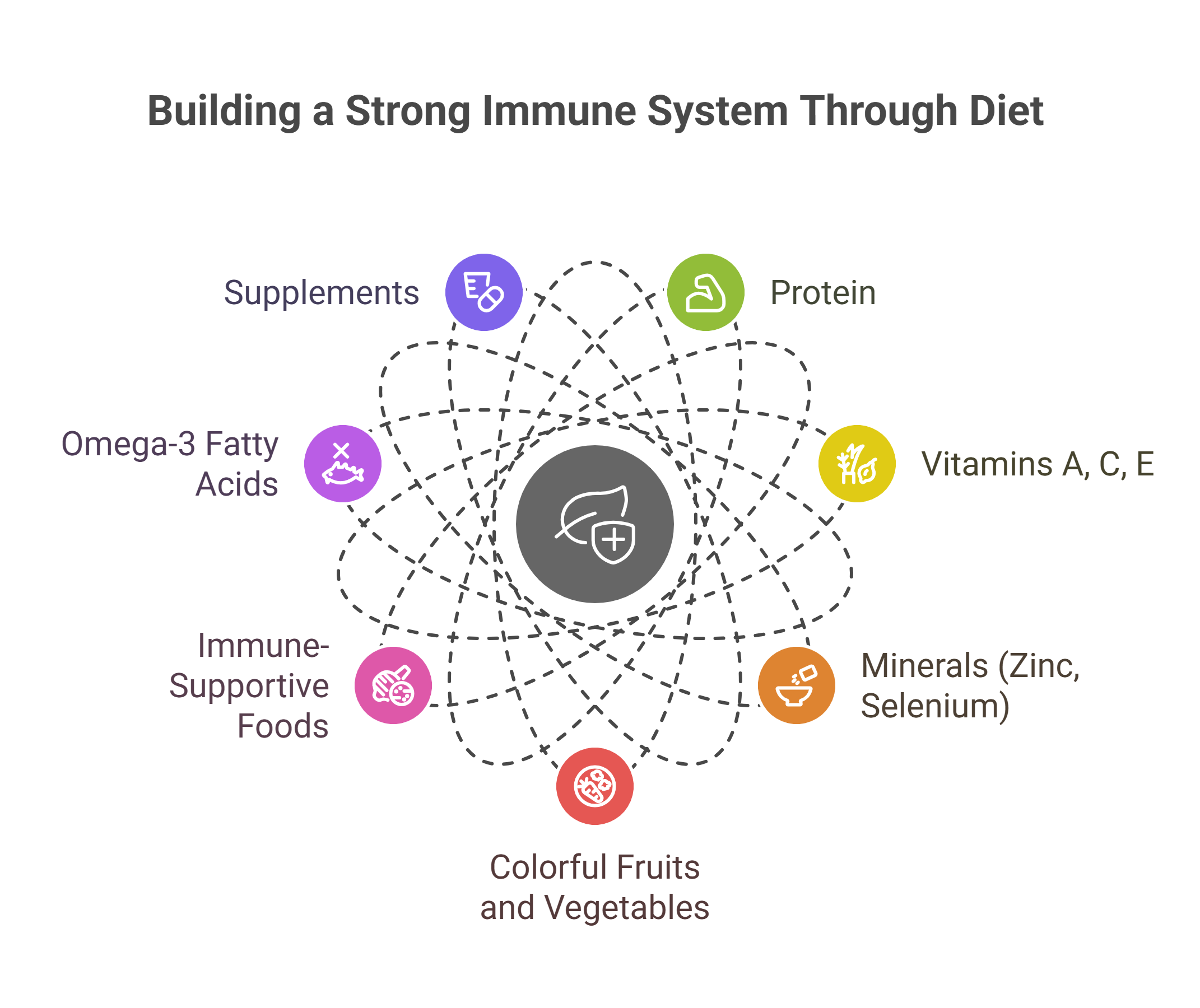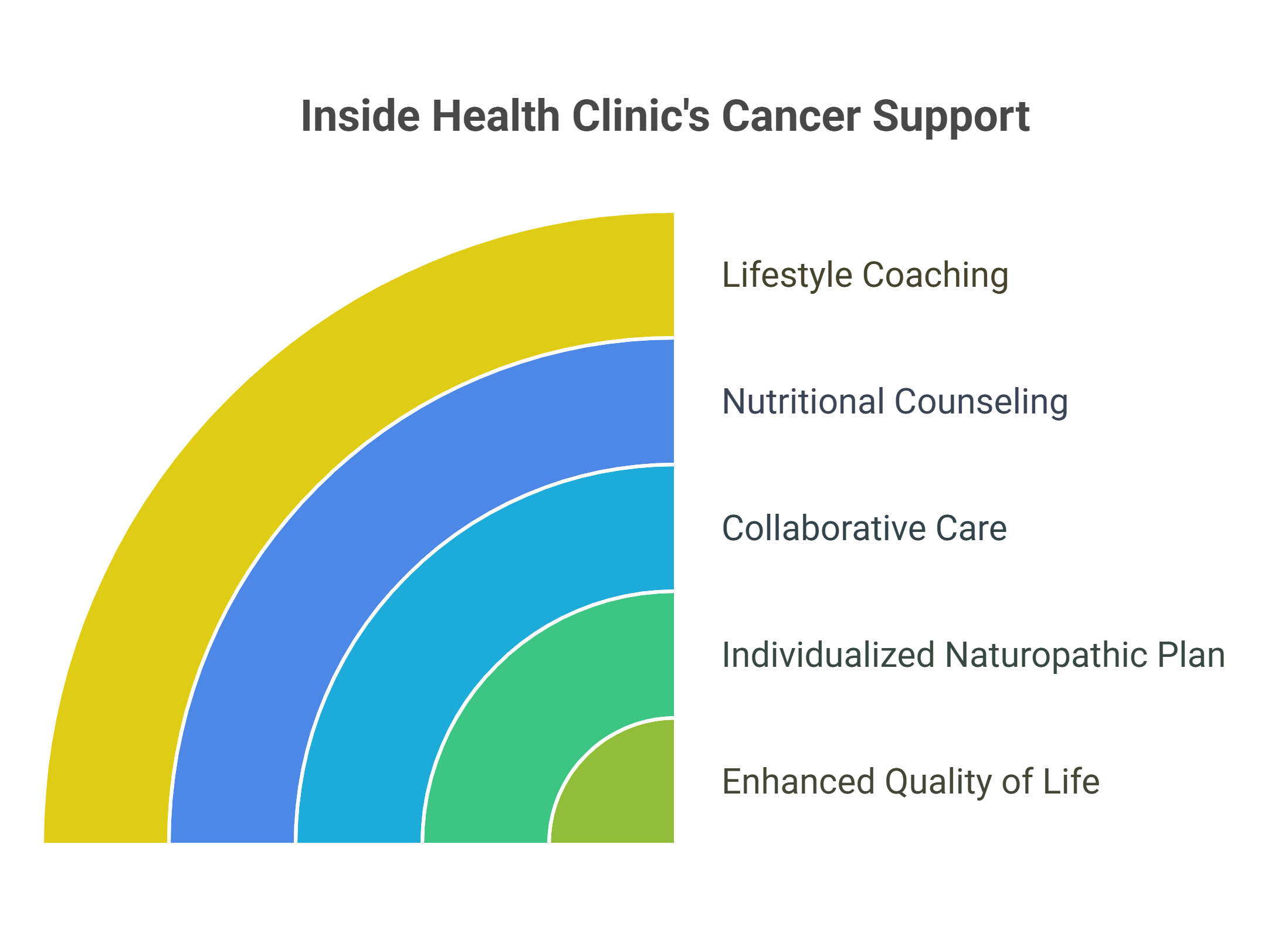Introduction
Feeling worn out, battling frequent infections, or experiencing slower recovery times doesn’t have to be your reality during cancer therapy. Many people face these hurdles because conventional treatments can sometimes dampen immune function. So, is there a way to actively support your body’s defenses, build resilience, and maintain a good quality of life while undergoing treatment? This piece looks at evidence-backed naturopathic strategies that can help bolster your immune system during this challenging time.
Here’s what’s key to understand from the get-go:
- Naturopathic methods—like focused dietary adjustments and herbal support—can play a real, measurable part in immune strength during cancer treatment.
- Integrative care, particularly when guided by experienced practitioners, improves both immune defense and overall well-being.
- Here at Inside Health Clinic, we specialize in developing individualized naturopathic plans to support your immunity at every stage of cancer therapy.
How Cancer Therapy Affects the Immune System
Cancer treatments such as chemotherapy, radiation, and even some immunotherapies, while targeting cancer cells, can also impact your healthy immune cells. These treatments can lead to a drop in white blood cell counts – the very cells that fight off infections. For instance, chemotherapy often doesn’t distinguish between rapidly dividing cancer cells and other rapidly dividing cells, like those in your bone marrow where immune cells are born. Radiation can also affect immune cells in the treated area and sometimes systemically.
This reduction in immune cell numbers and their effectiveness is what we call immune suppression. When your immune system isn’t at its full strength, your body becomes more vulnerable. This sets the stage for secondary issues like bothersome infections (bacterial, viral, or fungal), increased fatigue that goes beyond normal tiredness, and a general delay in your body’s ability to bounce back. Understanding this helps us see why supporting your immune system is so vital. ️
Principles of Naturopathic Immune Support in Oncology
Naturopathic medicine operates on a few core ideas that are especially relevant when supporting individuals through cancer care. First, it’s about ‘treating the whole person’ – looking beyond the diagnosis to understand your unique physical, emotional, and lifestyle context. Second, there’s a deep respect for ‘the healing power of nature’, meaning we work to support and stimulate your body’s own inherent ability to heal and find balance. Identifying and addressing underlying vulnerabilities, rather than just managing symptoms, is also a cornerstone.
A critical aspect of naturopathic immune support in oncology is the careful personalization of any strategy. What works for one person might not be suitable for another, especially given the complexities of different cancer types and treatment protocols. Safety is absolutely paramount; this means choosing interventions that are not only effective but also safe to use alongside conventional treatments, avoiding any potential negative interactions. It’s all about creating a supportive plan that fits *you*. ✨
Role of Herbal Medicines and Natural Compounds
Nature’s pharmacy offers some remarkable allies for immune support! Several Herbal medicines and natural compounds have been studied for their ability to modulate or boost immune function, particularly for individuals undergoing cancer therapy. You might have heard of medicinal mushrooms like Reishi, Shiitake, Maitake, and Turkey Tail, which contain polysaccharides (like beta-glucans) known for their immune-activating properties. Ginseng (Panax ginseng) is another well-researched herb, often used for its potential to combat fatigue and support immune responses.
Turmeric, with its active compound curcumin, is celebrated for its anti-inflammatory and antioxidant effects, which can indirectly support a healthier immune environment. Green tea, rich in epigallocatechin gallate (EGCG), also shows promise in supporting immune cell function and offering antioxidant protection. These compounds often work by influencing cytokine production, enhancing the activity of natural killer (NK) cells, or supporting the function of other immune cells like T-cells and macrophages.
While the potential benefits are exciting, it’s super important to approach herbal medicine with care and professional guidance. Some herbs can interact with chemotherapy drugs or other medications, and not all herbs are appropriate for every type of cancer or every individual. A knowledgeable naturopathic doctor can help select the right compounds, at the right doses, and ensure they are used safely within your overall treatment plan.
“Natural products and traditional herbal medicine are an important source of alternative bioactive compounds…their immunomodulation properties and their capacity to activate the immune system to fight against multifactorial diseases like cancer.” – PMC
“Natural products can enhance anti-tumor immunity by promoting DCs maturation…components of natural products can modulate the immune system by targeting DCs, including flavonoids, polysaccharides, phenolic compounds, saponins, and so on.” – PMC
Dietary Strategies to Strengthen Immune Function
What you eat plays a massive role in how well your immune system functions, especially when your body is working overtime during cancer treatment. Key nutrients are the building blocks for a robust immune response. Protein is essential for repairing tissues and making immune cells and antibodies. Vitamins A, C, and E are powerful antioxidants that protect immune cells from damage. Minerals like zinc and selenium are crucial for immune cell development and function. A diet rich in colorful fruits and vegetables, lean proteins, and healthy fats provides these vital nutrients.
Some practical dietary tips include aiming for a rainbow on your plate every day to get a wide array of phytonutrients. Incorporate foods like garlic, onions, ginger, and cruciferous vegetables (broccoli, kale, Brussels sprouts) known for their immune-supportive compounds. Omega-3 fatty acids, found in fatty fish like salmon, as well as flaxseeds and walnuts, can help manage inflammation. Sometimes, particular supplements may be recommended by a naturopathic doctor to address deficiencies or provide an extra immune boost, but this should always be personalized.
“A balanced healthy diet is crucial in maintaining a strong immune system during cancer treatments. Specific nutrients like protein, vitamins, and minerals are essential for healthy immunity.” – ACTC Health
Lifestyle Factors: Exercise, Sleep, and Stress Reduction
Beyond diet and herbs, how you live day-to-day profoundly impacts your immune health. Gentle, regular physical activity, as tolerated, can be a game-changer. ♀️ Exercise helps improve circulation, which allows immune cells to travel through the body more efficiently. It can also help reduce inflammation and combat treatment-related fatigue. Even short walks or gentle stretching can make a difference.
Adequate, restful sleep is when your body does its critical repair work, including producing and releasing cytokines – proteins that help fight inflammation and infection. Aim for 7-9 hours of quality sleep. Stress management is equally vital. Chronic stress can elevate cortisol levels, which can suppress the immune system over time. Mind-body practices like meditation, deep breathing exercises, yoga, or spending time in nature can help lower stress and support emotional well-being, indirectly benefiting your immunity. ♀️
“Exercise has been shown to stimulate the production of immune cells, improving their ability to detect and fight off infections and diseases.” – ACTC Health
Fasting and Metabolic Approaches for Boosting Immunity
There’s growing interest in how metabolic strategies, like fasting or calorie restriction, might influence the immune system and even cancer outcomes. Some research, primarily in animal models and early human studies, suggests that short periods of fasting may help protect healthy cells from chemotherapy toxicity while making cancer cells more vulnerable. It’s also thought to trigger cellular cleanup processes (autophagy) and potentially rejuvenate immune cells.
Specifically, some studies indicate that fasting can enhance the activity of natural killer (NK) cells, which are important for fighting cancer. While these findings are promising, it’s crucial to state that fasting is not appropriate for everyone, especially those at risk of malnutrition or with certain medical conditions. Any consideration of fasting or significant dietary restriction during cancer therapy must be discussed thoroughly with your oncology team and a knowledgeable naturopathic doctor to weigh potential benefits against risks.
“Fasting reprograms these natural killer cells to better survive in this suppressive [tumor] environment, while also improving their cancer-fighting ability.” – Memorial Sloan Kettering Cancer Center
Integrative Approaches: Combining Naturopathy with Conventional Care
The best approach to supporting your health during cancer therapy is often an integrative one. This means thoughtfully combining conventional medical treatments (like chemotherapy, radiation, surgery) with evidence-informed naturopathic strategies. Open communication and collaboration between your oncologist and your naturopathic doctor are key to ensuring a safe and effective plan.
When naturopathic care is integrated, it can help manage treatment side effects, support immune function, improve energy levels, and enhance overall quality of life. Your naturopathic doctor can help select therapies that complement your conventional treatments, avoiding any potential negative interactions and ensuring that all aspects of your health are considered. This teamwork allows for a more comprehensive and person-centered approach to your cancer journey.
“Herbal medicines have been widely used as adjuvant agents for cancer treatment and can also enhance the sensitivity of chemotherapeutic [agents].” – Wiley Online Library
Safety, Contraindications, and Evidence Gaps
While naturopathic strategies offer many potential benefits, it’s vital to be aware of safety considerations. Some herbs and supplements can interact with medications, including chemotherapy and hormone therapies, potentially making them less effective or increasing side effects. For example, St. John’s Wort is known for many drug interactions. High doses of certain antioxidants might, in some contexts, interfere with the way radiation or some chemotherapies work.
This is why self-prescribing is risky, and professional guidance from a naturopathic doctor experienced in oncology care is so important. They can help you make choices based on the best available evidence, your individual cancer type, treatment plan, and overall health. It’s also true that for some natural therapies, the research is still developing. We rely on traditional use, preclinical data, and emerging human trials, always prioritizing safety. Common misconceptions can also exist, so getting accurate information is key.
How Inside Health Clinic Supports Immunity During Cancer Therapy
At Inside Health Clinic, we’re passionate about providing compassionate and evidence-informed naturopathic support for individuals navigating cancer therapy. Our approach begins with a thorough assessment, listening carefully to your health history, current treatments, and personal goals. We then develop an individualized naturopathic plan, drawing on strategies with good scientific backing and a strong safety profile. We believe in working collaboratively with your oncology team, ensuring our recommendations fit seamlessly and supportively into your overall care. Ongoing monitoring allows us to adjust your plan as needed, ensuring you feel supported every step of the way.
We offer a range of services designed to bolster your immune system and well-being. This includes personalized nutritional counseling to optimize your intake of immune-supportive nutrients, guidance on safe and effective herbal medicines, and practical lifestyle coaching covering exercise, sleep hygiene, and stress-reduction techniques. Our aim is to empower you with natural tools to help you feel stronger, more resilient, and maintain the best possible quality of life during and after cancer treatment.
FAQs
- Can naturopathic therapies replace conventional cancer treatments?
Absolutely not. Naturopathic strategies are designed to work *alongside* (as adjunctive or supportive care) your medical cancer treatments, not as a replacement. The goal is to support your immune system, manage side effects, and improve your overall well-being during the treatment process. - Which herbs or supplements are safe to use during chemotherapy?
This is highly individual! Some herbs and supplements can interact with chemotherapy drugs or other medications, while others can be very beneficial. It’s crucial to get personalized advice from a naturopathic doctor who is knowledgeable about oncology and can assess potential interactions based on your specific treatment regimen. - How soon can I expect to notice improvements in my immunity?
This varies from person to person. Some people might notice improvements in energy or fewer minor infections within a few weeks, while for others it might take longer. It depends on your baseline health, the type of cancer and treatment, and how consistently you follow your personalized naturopathic plan. Patience and consistent effort are key. ⏳ - Do all patients benefit equally from naturopathic strategies?
Benefits can vary. Factors like the type and stage of cancer, the conventional treatment regimen, your overall health status before starting, genetic factors, and adherence to the naturopathic plan all play a part. The goal is always to create a plan that provides the most possible benefit for *your* unique situation. - Are there risks to boosting the immune system too much during cancer treatment?
This is an important consideration. While generally the aim is to support and balance immune function, inappropriate or excessive immune stimulation could theoretically be counterproductive in certain situations, such as with some autoimmune conditions or potentially with certain types of cancer or immunotherapy. This is another reason why professional guidance from a practitioner knowledgeable in integrative oncology is essential to ensure strategies are well-chosen and safe.
Conclusion
Combining evidence-based naturopathic strategies with your conventional cancer therapy can be a powerful way to actively support your immune health. Thoughtfully chosen herbal medicines, personalized nutrition, beneficial lifestyle adjustments, and coordinated integrative care can help strengthen your body’s natural defenses, reduce the burden of side effects, and improve your resilience throughout your treatment journey. You don’t have to go through this alone.
If you or a loved one are undergoing cancer therapy and looking for ways to feel stronger and more supported, Inside Health Clinic offers expertise in safe, individualized naturopathic strategies to effectively boost immunity. We invite you to reach out for a personalized consultation and discover how integrative care can make a positive difference in your journey. Your well-being is our priority.
Key takeaways:
- Naturopathic approaches—including herbal medicine, diet, and lifestyle—can boost immunity during cancer therapy.
- Professional guidance is critical to ensure safety and maximize benefits from integrative strategies.
- Combining naturopathic and medical care optimizes support for both your immune system and overall well-being.



